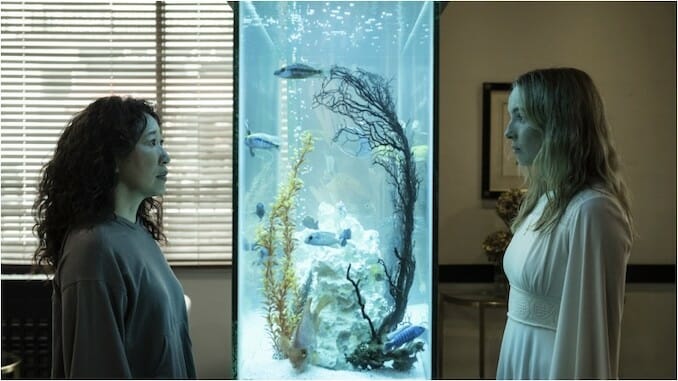The Final Season of Killing Eve Still Seems Focused on the Wrong Things
Photo: BBC America
When the news broke that the fourth season of BBC America’s female-led thriller Killing Eve would also be its last, the announcement couldn’t help but feel a bit bittersweet. The cat-and-mouse drama, with its aggressively female focus, glossy candy-coated aesthetic, and dedication to subverting established genre tropes, is like nothing else on television right now. And even though the show certainly has its flaws, the idea of a media landscape without the complicated dance between former MI-6 agent Eve Polastri (Sandra Oh) and stylish assassin Villanelle (Jodie Comer) is a much more drab and uninteresting place.
Yet, at this point, it’s equally hard not to watch this show and think its end is something of a mercy. Because no matter how enjoyable Killing Eve may be—and Season 4 has all the signs of being visually stunning (these clothes!) and generally entertaining (the black humor!) as its predecessors—it still doesn’t seem to know what it wants from its own story. Or how to define the relationship at its center. And four seasons in, it has become an increasingly insurmountable problem.
While there’s a lot to love about Killing Eve’s snazzy formula, with its snappy one-liners and wide array of complicated female characters, one of its most annoying aspects is its almost pathological need to reset itself at the beginning of each season, a move likely due to its annual change in showrunners behind the scenes. And while I’m as excited as anyone to see a series giving women a chance to run a show and hone their technical craft (Emerald Fennell got a Best Director nomination for Promising Young Woman after her turn at the helm in Season 2 after all!) the frequent changes often mean the show has little to no consistency in tone or identity from season to season.
Case in point: Season 4 begins with Villanelle and Eve once again living separate lives. Villanelle, desperate to prove she can be something more than the monster the world always told her she is, is looking for connection and purpose in religion. (How she arrived at that particular life plan is anyone’s guess, however.) Killing Eve seems as fascinated as ever by the dichotomy that exists within this character, questioning whether she is truly capable of change even as it reminds us what a psychopath she actually is. And Comer, to her credit, does wonders with what she’s given, often conveying Villanelle’s battle against her worst impulses with little more than a slight change in facial expression.
Meanwhile, Eve seems… fine? At the very least, the character is less passive than she was for the bulk of last season, which is a promising start—even if Killing Eve still comes across as generally more interested in Villainelle’s emotional journey than that of the woman whose name is in the show’s title. As Season 4 opens, Eve has joined a security firm, found a (hot) new man-friend/coworker with whom she appears to have a sort of no-strings-attached sexual relationship (sorry, Villanelle, I guess), and is busy trying to track down the mysterious all-powerful shadow group known as The Twelve. She seems relatively unaffected by the various dark and traumatic events she’s recently experienced. (Remember when she almost died? And then sort of helped kill Villanelle’s former handler? Good times.) Mostly, she just looks tired. Which, relatable, but still.
-

-

-

-

-

- Curated Home Page Articles By Test Admin October 21, 2025 | 3:10pm
-

- Curated Home Page Articles By Test Admin October 21, 2025 | 2:57pm
- Urls By Test Admin October 21, 2025 | 2:57pm
- Curated Home Page Articles By Test Admin October 21, 2025 | 2:55pm
-

-

-

-

-

-

-

-

-

-

-

-

-

-

-

-

-

-

-

-

-

-

-

-

-

-

-

-

-

-




































